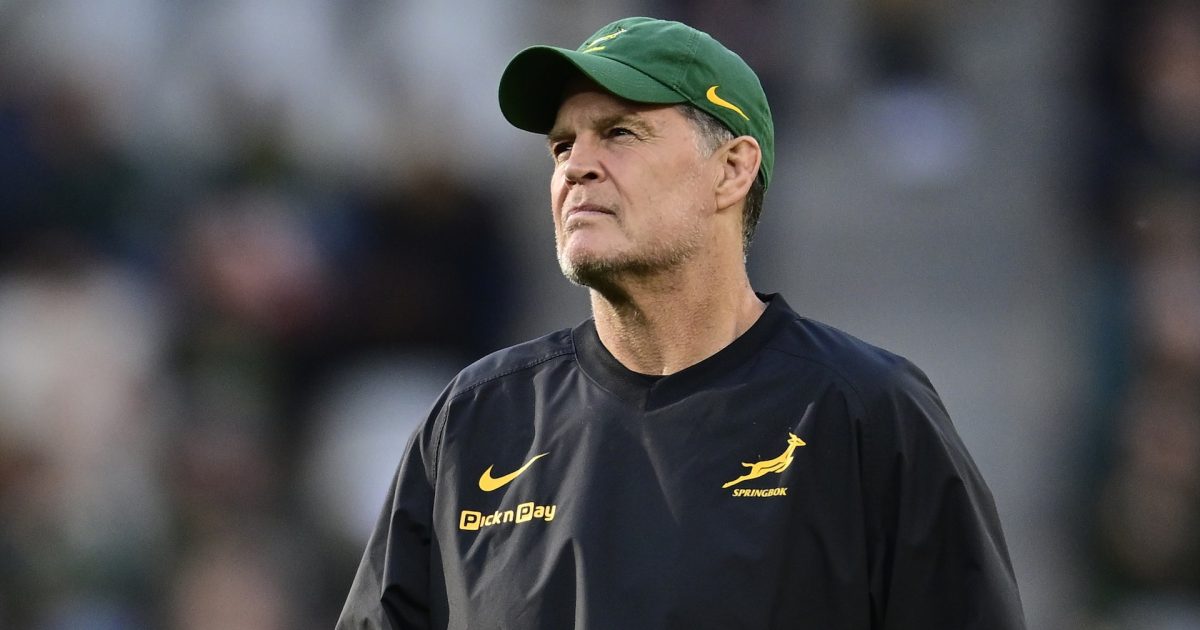There are few things as unapologetic as a Springboks pack on the charge. Whether that snarling mass of humanity is scrumming, mauling or simply trampling hapless tacklers around the fringe, the phalanx of green has little time for sympathy or tenderness.
Which makes some recent comments by Rassie Erasmus all the more puzzling. Speaking after his team’s 30-22 victory over Australia in Cape Town, a result that steadied the ship after a shock 38-22 reverse in Johannesburg a week earlier, the Springboks coach was in a penitent mood.
“We are trying to please our crowds by winning and playing a better brand and sometimes we get it wrong like we did last weekend, but sometimes when we get into games like this where it’s a real grind we tend to find a way.
“We tend to struggle when it’s an open, free-running game – it’s beautiful rugby but you lose on the scoreboard. Overall, we’ll learn from this and hopefully the tighter the matches get, we’ll get more comfortable with it as we have been in the past.”
Fixture
Rugby Championship

New Zealand

South Africa
This was a strange admission to make for three reasons. Firstly, Erasmus’ words are self-limiting, effectively conceding that the Springboks coaching staff are forced to pick between winning and entertaining, narrowing what this side can believe it’s capable of. What has attack coach Tony Brown made of this statement? Is he now under pressure to devise a new strategy? Wasn’t he appointed for the sole purpose of injecting spark in the backline?
Secondly Erasmus’ concession feels like a critique of some of his attacking players. Manie Libbok was at fault for one of Australia’s tries in Johannesburg when he chucked a wild intercepted pass, and he was at times guilty of overplaying elsewhere, but there’s no question that at his best he has the attacking nous to unlock any defence. Grant Williams is providing zip from scrum-half. Sacha Feinberg-Mngomezulu is a bona fide problem with ball in hand. The wings dazzle, the full-backs strike from distance, the centres boast deft touches and lightning feet when given licence to roam.
The Springboks are not simply a blunt object. On their day they can be just as incisive and sharp as any other top team. Erasmus’ words – perhaps self-deprecating and self-preserving – feel restricting. It’s like he’s vowed to keep the Ferrari parked in the garage just because he stalled the engine a couple of times.
There’s a third reason why Erasmus’ comments came across as baffling and this is the most important of the lot. Erasmus was apologetic. He never said ‘sorry’, but there was no mistaking his tone. As a coach he has always tapped into the direct line between himself and the supporting public and these post-match comments seemed to reach beyond the listening journalists in an attempt to touch the paying public.
None of this is necessary. Because the only thing that truly matters to South African rugby supporters is the result of a Test match. Not style, not passes in the tramlines, not turnovers won, not ruck speed across 80 minutes. None of that holds a candle to the significance of the score-line at the final whistle.
Oh, New Zealand played the better rugby during the 2023 World Cup final? Cool. Oh, England bossed the skies and deserved to win the semi-final? Grand. Oh, France did most of the running in the quarter-final with Antoine Dupont playing the role of hometown hero? Lekker bru.
All rugby supporters love to support a winning team. South Africans are not unique in this regard. But because of the political, cultural and social role that the team plays in the country, there’s an argument to be made that no other rugby nation needs their team to win as much as South Africans. Even the All Blacks, who embody New Zealand’s best traits and are the nation’s most recognisable brand, don’t carry quite the same burden.
And isn’t this a sign of the strength of the Boks? Almost every other international coach would love to have the problem of making apologies after a win. Would the head coaches of Scotland, Argentina, England or Wales feel the need to face a press conference and effectively downplay a triumph over Australia? Would they droop their eyes and repent because their team didn’t execute an array of coast-to-coast tries? Of course not. They’d sit at the top table beaming, proud of the fact that their team emerged victorious.
The Springboks were lambasted last week. The frustrations were palpable on social media, on podcasts, in newspapers and around braais. They were criticised for moving too far from their DNA, for being arrogant, for not showing the Wallabies enough respect. They copped the requisite heat and reverted back to their strengths.
Erasmus may not truly be apologising. He might be insulating his players, lowering the noise around attacking experiments, reminding supporters that South Africa’s greatest weapon has always been its ability to grind when others gasp for air. In that sense, his words were less an admission of weakness than a reassertion of identity.
Because the truth is, the Springboks’ style has never been about aesthetics. It’s about suffocation, attrition, the slow squeeze that eventually breaks the opposition. The fact that they have players capable of flair is a luxury, not the foundation. Perhaps Erasmus’ greatest trick has been to convince the world, and sometimes even his own public, that beauty is optional, but winning is non-negotiable.
And that’s the paradox: the more the Springboks double down on the ugly, the more beautiful victory becomes.

 Match Summary
Match Summary 